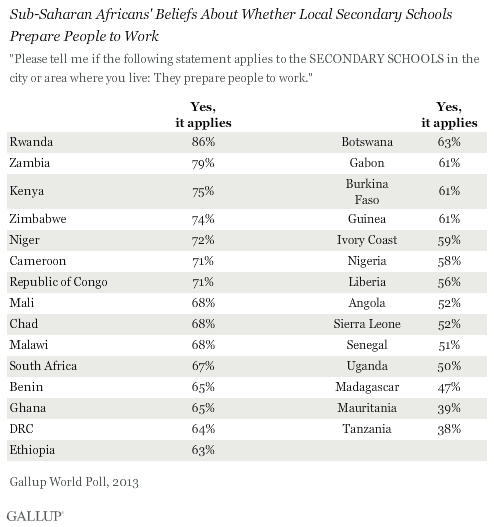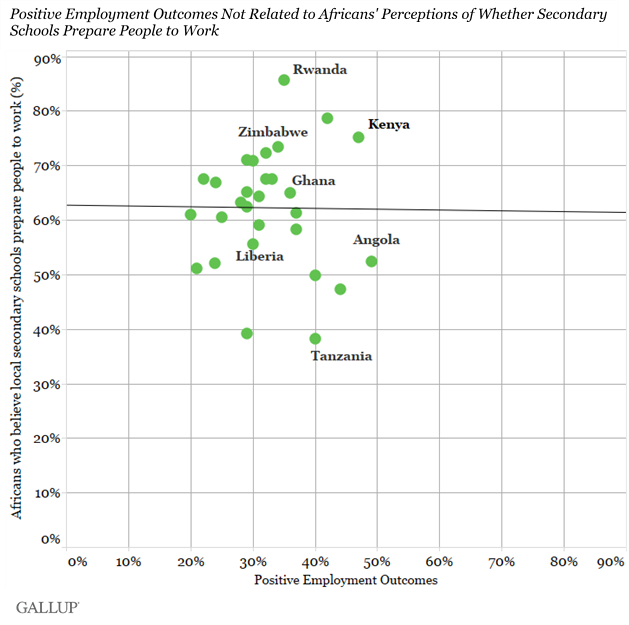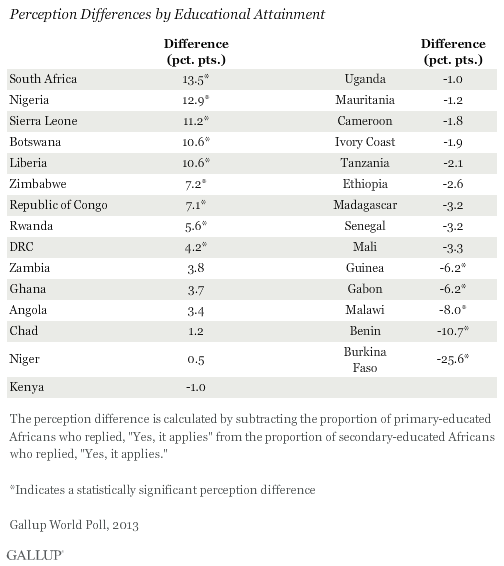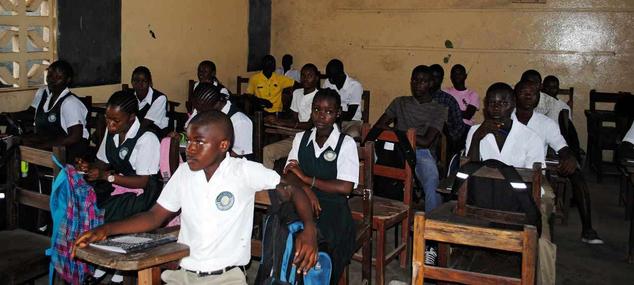Story Highlights
- Views of secondary schools not related to employment outcomes
- In 14 of 29 countries, perceptions differ significantly by education level
WASHINGTON, D.C. -- As sub-Saharan African countries continue to pursue sustainable development, their residents' views about their local secondary schools provide insight into how education policies intersect with people's lives. Africans' perceptions of whether their secondary schools prepare people to work vary widely by country; the percentage agreeing this is true of their local schools ranges from 86% in Rwanda to 38% in Tanzania.

Just as sub-Saharan Africans with more education do not always see an employment benefit from their schooling, their perceptions of whether their secondary schools prepare people to work do not track with their positive employment outcomes. Gallup defines positive employment outcomes as working full time for an employer, working part time but not wanting full-time work or being self-employed by choice and not because one cannot find a job.
For example, Burkina Faso has the lowest percentage of its population with positive employment outcomes (20%), but more than 60% of Burkinabes believe the secondary schools prepare people to work. This statistic gains further context when considering that only 10% of Burkinabes have some secondary education. On the other hand, the percentage of Tanzanians with positive employment outcomes is 40%, but only 38% agree that local secondary schools prepare people to work. This disconnect suggests many Africans understand that a positive employment outcome is tied to factors other than education, such as stability, rule of law and the effect those factors have on the private sector.

Perception Differences Vary Across Sub-Saharan Africa
In the majority of countries surveyed, there is no significant difference in Africans' views of their secondary schools by their level of education. In these countries, Africans with some secondary education and those with a primary education or less are as likely to believe their secondary schools prepare people to work.
In countries where significant gaps exist between those with more and less education, the findings suggest other factors likely influence the difference. For example, in Burkina Faso, more residents with primary education or less (64%) believe local secondary schools prepare people to work than do residents with at least some secondary education (38%). Given the low percentage of the population with positive employment outcomes, this gap suggests Burkinabes with primary education believe the secondary school curriculum affords an employment advantage that many who complete at least some secondary school do not experience.
In South Africa, on the other hand, where the percentage with positive employment outcomes is four percentage points higher than Burkina Faso's, the net perception difference between South Africa's two education groups is 13.5 points. The difference between the two countries may lie in the benefit that higher education yields with respect to employment outcomes. South Africans with some secondary education have better employment outcomes than those with basic education. On the other hand, Burkinabes with some secondary education have statistically similar employment outcomes as those with basic education.
The 15 countries with no statistically significant perception differences reflect countries where those with more education experience similar or better positive employment outcomes than those with a basic education (except in Madagascar). Thus, more highly educated Africans are better off, or no worse off, than their less-educated counterparts. The similar perceptions may indicate that all Africans recognize and value the employment benefit experienced by those with more education.

Implications
The United Nations Development Programme identifies job creation as the first of three prongs for its post-2015 development agenda. Specifically, it highlights that "in the past decade, Africa's labor force grew by 91 million people, but only 37 million of these were in jobs in wage-paying sectors." As African governments invest in education, the shortfall of wage-paying jobs will likely exacerbate the perceptions divide without addressing the dearth of jobs.
While significant differences in perceptions of secondary schools exist between Burkina Faso and South Africa, there is no significant difference between the countries' positive employment outcomes. This suggests the differences in perceptions involve factors other than employment outcomes. The state of the economy, confidence in the rule of law and many other factors likely influence Africans' perceptions as well.
The net perception difference in many countries presents an opportunity to further explore issues of educational attainment, employment outcomes and issues of good governance in sub-Saharan Africa. Furthermore, it reveals the importance of comprehensive policies that do not prioritize one facet at the expense of another.
Survey Methods
Results are based on face-to-face interviews with at least 1,000 adults in each country, aged 15 and older, conducted in 2013. For results based on the total sample of national adults, the margin of sampling error ranges from ±3.8 percentage points to ±4.1 percentage points at the 95% confidence level. The margin of error reflects the influence of data weighting. In addition to sampling error, question wording and practical difficulties in conducting surveys can introduce error or bias into the findings of public opinion polls.
For more complete methodology and specific survey dates, please review Gallup's Country Data Set details.
Learn more about how the Gallup World Poll works.

